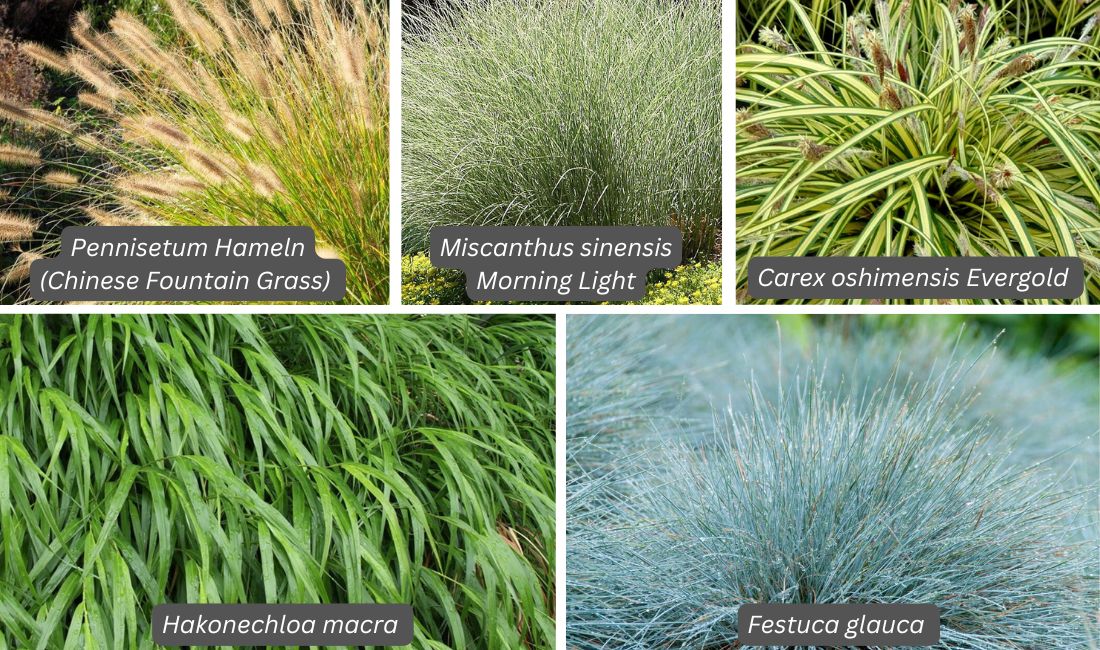
Ornamental grasses bring a style and beauty to the garden that cannot be achieved using other plants. Grasses bring movement to the garden, not only in the way they stir in the breeze but also in how they ebb and flow throughout the year, from their young fresh growth in spring, to their fluffy flowerheads in late summer, to their autumn tints and shades. They even bring sound to the garden as they rustle in the wind.
Available in many different shapes, sizes and styles, some of them evergreen and others deciduous, ornamental grasses can be used in many ways - for block planting, mixed borders, as individual specimens, or in containers.
Ornamental grasses are one of the easiest plants to grow - they thrive practically anywhere that has enough light and sun and need only minimal annual maintenance. With their thin leaves reducing the transpiration rate, many (although not all) ornamental grasses are drought tolerant. All the grasses offered by Clifton Nurseries are tough hardy plants that will thrive year after year.
Caring for Ornamental Grasses
With many grasses thriving in hot sunny conditions, the majority of them prefer full sun and well drained soil that does not get waterlogged, particularly in winter.
Although many grasses are drought tolerant, when first planting these plants it’s still worthwhile improving the water-holding abilities of your soil by adding organic matter such as homemade compost or bags of SylvaGrow® Farmyard manure. This will act like a sponge, holding water in the soil. Mulching the soil around the plants with a layer of bark chippings, gravel or pebbles will also help to reduce moisture evaporation.
Water them regularly until they are established as they only become drought tolerant after they’ve had a chance to establish and put down a good root system. As with most garden plants, we recommend feeding all ornamental grasses in the spring with a general slow-release fertiliser.
Evergreen grasses need only a very light trim in late winter to remove any split leaves and old flower heads — any dead leaves can be pulled out by hand or cut out with secateurs.
Although the leaves of deciduous grasses turn brown in winter, they can be left to provide a structural feature. In late winter, when they start to look untidy, cut back all of the stems to ground level and remove the debris. Fresh leaves will emerge in spring and grow rapidly.
To keep ornamental grasses looking fresh, divide clumps every few years or replace them if they become too woody or untidy.
Our Favourites
Our friendly team are always happy to advise on suitable plants for your space, including ornamental grasses, but we do have a few favourites that, given the right location, every garden should have!
Festuca glauca – stunning small mound-shaped blue grass up to 30cm high. The striking evergreen blue foliage is topped with short spikes of blue-green flowers that fade to a yellow-brown colour as they age. Ideal in gravel gardens with Mediterranean-style plants. To ensure the best blue foliage colour ensure it’s planted in full sun with good drainage.
Carex oshimensis Evergold – beautiful small mound-shaped grass up to 30cm high with glossy creamy green leaves with dark green margins. Prefers a bit more damp and shade than most grasses. This evergreen grass is ideal for providing colour all year round. Relatively slow growing.
Miscanthus sinensis Morning Light – elegant deciduous grass up to 1.2m high. Narrow white leaf margins give a silvery effect and are topped with pink-tinged panicles of flowers in autumn. Thrives in well drained soil in full sun.
Hakonechloa macra – perennial grass with mounds of bright green cascading leaves topped by airy sprays of flowers in mid- to late summer, and leaves developing red brown tints in autumn. Up to 45cm. Thrives in sun or part shade. Similarly popular is Hakonechloa macra Aureola with its striped green and yellow foliage.
Pennisetum Hameln (Chinese Fountain Grass) – a clump forming deciduous fountain grass with mounds of bright green foliage. Produces beautiful long-lasting bottlebrush flower-spikes from late summer onwards, in shades from light brown to soft pinks and light maroon. In autumn the foliage turns a beautiful bright golden-yellow before dying back, to re-emerge in the spring.

Clifton Nurseries Garden Centre
London, W9 2PH
0207 432 1867
Monday – Saturday 9am-5:30pm, Sunday 10.30am-4.30pm
Clifton Nurseries Garden Services
London, W9 2PX
